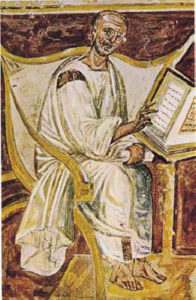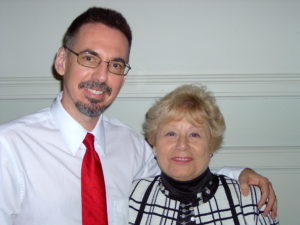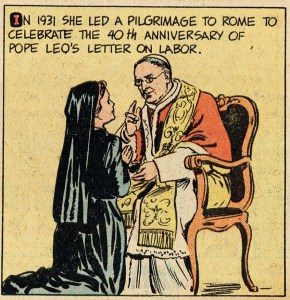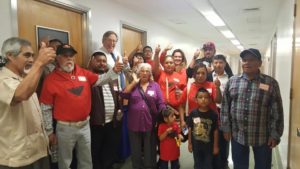by Bill Droel
A small number of Catholics more or less believes that capitalism is evil. On the other extreme an even smaller number of neoconservative Catholics believes that humanistic capitalism is God’s preferred system.
Most Catholics implicitly take a micro-position, confining judgment to particular cases. Thus these Catholics might see holiness in the work of a hospice nurse or a special-education teacher. These Catholics, if they thought about it, also see goodness in some small business owners, but probably not in a big-time financier.
John Raskob (1879-1950) was “an architect of the capitalist system,” his biographer David Farber details. He was also a serious Catholic.
Raskob was involved with many tycoons of his time. His name, however, is lost to popular history, Faber writes, because he “never ran a major corporation. He never invented a noteworthy product.” Rather, Raskob was passionate about credit markets and leveraged financing. He was fluent in asset valuation, bond divestures, real estate markets, stocks and the like. He put together the deal that made DuPont Company a major business. He then did something similar for General Motors. Yet, according to Faber, “Raskob was driven not by greed or avarice or by the desire for adulation and power.” He disliked awards and avoided recognition. For example, Raskob financed a skyscraper in Manhattan. It is not called Raskob Tower, but rather The Empire State Building. “He was the anti-Trump of his time,” says Faber.
The title of Raskob’s biography is taken from one of his slogans, Everybody Ought To Be Rich (Oxford University Press, 2013). Though the slogan can be misinterpreted, he meant that the economy’s wealth should be open to more people, including hourly workers. Raskob believed that, given the appropriate instruments, the market can help stabilize families. It was Raskob, for example, who created the consumer credit that is taken for granted today. William Durant (1861-1947) had a small company called General Motors. Raskob got involved with it, envisioning competition with Ford Motor. His innovation was car-buying on the installment plan with GM and other entities floating the credit. Likewise, all of today’s 401K plans have a Raskob lineage.
Raskob was generous toward Catholic causes, both stateside and through the Vatican. It is no surprise that Raskob eschewed public recognition for his donations.
Raskob tried to donate in ways that would yield more predictable income for Catholic institutions. For example, he instituted the first endowment fund for a diocese. Hundreds of Catholic institutions today use Raskob’s plan. He also pioneered the separate incorporation of auxiliaries to Catholic institutions, which is also common now. He popularized the idea of matching-grant fundraising drives.
Raskob’s most significant contribution to internal Church operations was his insistence that lay people should assume responsibilities for which their character and training is better suited than those trained primarily in theology, Faber writes. He fought to give laypeople a greater role inside the church and to a degree his life reflected the role of the layperson in the world.
One more area of Raskob’s life is worth mentioning and retains relevance. Day-to-day he was not affected by prevalent and overt anti-Catholicism and by hostility toward immigrants. Raskob hung out with the elite and had an upper-class lifestyle. But he was opposed to the second-class treatment given to immigrants. He saw right through Prohibition; that it was disguised anti-Catholicism.
At some point Raskob met Al Smith (1873-1944) through a club. When it came time for Smith to launch his 1928 presidential campaign, he chose Raskob as campaign manager and chair of the Democratic National Committee. All of Smith’s advisors opposed the choice. First, the advisors knew that Raskob had no prior political experience. Second, the advisors were sure that the opposing campaign, already using Smith’s Catholicism against him, would claim that Catholics are taking over the government. (Today, the Ku Klux Klan is associated with racial bigotry. But the Klan began as a mostly anti-Catholic movement. True to their hatred, the Klan vilified Smith as a “papist puppet.”)
Some time ago, I participated in a conference for Catholic leaders. One of the presenters made a startling announcement: “I find no spiritual nourishment in the United States. I am moving to England.”
I was baffled as to why she would pick England as a spiritual oasis. But more importantly, I was disturbed that a Catholic would give a wholesale condemnation to our society. Obviously, our culture has serious defects. But isn’t it better for a Christian to start with society’s achievements and to faithfully engage the ebb-and-flow of daily life?
Raskob was not perfect. He could be judgmental toward others. He made some poor business decisions. And there are huge structural downsides to the capitalist system. Raskob is simply one U.S. Catholic who lived his spirituality in the context of finance.
Droel edits INITIATIVES (PO Box 291102, Chicago, IL 60629), a newsletter about faith and work.
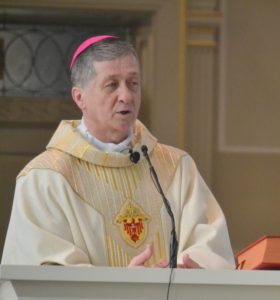 Early in October, Pope Francis announced his intent to create 17 new cardinals. The Catholic Labor Network was pleased to learn that Archbishop Blase Cupich of Chicago was among them – the Archbishop’s deep commitment to Catholic social teaching on labor and work is quite evident.
Early in October, Pope Francis announced his intent to create 17 new cardinals. The Catholic Labor Network was pleased to learn that Archbishop Blase Cupich of Chicago was among them – the Archbishop’s deep commitment to Catholic social teaching on labor and work is quite evident.
